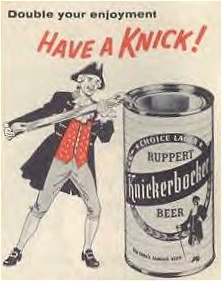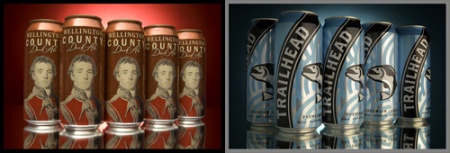 Recently, a thread was started on the Bar Towel forum that was intended to be a place for people to discuss what they saw as positive developments in the beer selection at the LCBO. Given that hating the LCBO seems to be considered by many as a prerequisite for being a craft beer drinker in Ontario, this was an interesting attempt at diplomacy.
Recently, a thread was started on the Bar Towel forum that was intended to be a place for people to discuss what they saw as positive developments in the beer selection at the LCBO. Given that hating the LCBO seems to be considered by many as a prerequisite for being a craft beer drinker in Ontario, this was an interesting attempt at diplomacy.
Of course, it didn’t take long for the discussion to go in a completely opposite direction, because obviously the dozens of other Bar Towel threads slamming the LCBO in one way or another just aren’t enough for some people. But then, somewhere around the middle of the second page of the thread, it shifted yet again into a discussion of the pros and cons of using cans to package craft beer.
As you’ll see from my contribution to the thread, I’m pretty solidly on the pro-can side of things, although I haven’t always been. I recall, for example, being quite shocked during a visit to a small brewery in Quebec about 5 or 6 years ago when the brewer said that he would prefer to see his beer available in cans rather than bottles. They way he saw it, the beer would stay fresher for longer, which would make for happier customers.
(Of course, considering that this same brewery has since become infamous for quality control issues that cause many of their beers to become infected and go sour soon after bottling, it could be argued that dealing with what they’re putting into the bottles is probably more important than switching those bottles to cans.)
Anyway – my shocked reaction made some sense, since in the Ontario market at the time, cans were almost exclusively the domain of “premium” macro-lagers like Blue and Bud, or stomach churning buck-a-beers. Much like the “cork vs. screw-cap” debate in the wine world, bottles had a sense of class and dignity that was perfect for well-crafted beer, while cans were meant for shotgunning swill at frat parties or chugging overpriced corn-lager at ball games.
But then, a couple of things happened that changed my mind. First, the LCBO got a big environmental kick, and decreed that preference would be given to canned beer over bottled beer from now on. Arguments about which of the two is truly more environmentally friendly aside, this edict meant that many of the European and UK beers that I enjoyed, such as Pilsner Urquell and London Pride, started being sold in cans rather than bottles at the LC’. And once I tried them, I realized that I actually preferred the canned versions to the bottled! They were fresher and livelier tasting, and in the case of the Urquell in particular, I was happy that I no longer had to annoy LCBO staff by asking them to open a new case for me in order to avoid buying green bottles that had been sitting under fluorescent lights for an indeterminate amount of time.
Around that same time, I caught wind of a small brewery out in Colorado called Oskar Blues that had started canning their Dale’s Pale Ale, a relatively big (6.5%) and hoppy beer – i.e. the sort of beer that I usually like a lot. It took me a while to get my hands on a can, but when I finally got a chance to try it in mid-2006, I was very impressed, and equally so by their even bigger (8%) and similarly packaged Old Chub Scotch Ale. Finally, it sunk in: cans aren’t just good, they’re great, even for true craft-brewed beers.
There are many reasons for cans to be considered superior to bottles as a beer container, many of which are laid out in Lew Bryson’s latest First Draft column on Portfolio.com. The gist of the article is summed up nicely in these two paragraphs:
I just bought four cases of beer for a long weekend upstate-all cans, from three different breweries: I.P.A. from New England Brewing in Connecticut, pilsner and pale ale from Sly Fox in Pennsylvania, and Old Chub Scottish ale from Oskar Blues.
It just makes sense. The can is a superior package to the bottle. Cans are lighter and take up less space, making them cheaper to transport and store. They’re more durable once filled. Cans are completely lightproof, meaning the beer won’t get “skunked,” acquiring the nasty odor that comes from hops compounds breaking down in sunlight. Cans today come with a lining that keeps beer away from the aluminum, eliminating the metallic taste that used to affect canned beer. They seal up with very little air in the can, keeping the beer fresh longer. They’re even cheaper to recycle. Any “but it’s a can” stigma evaporates with the first taste of the emphatically nonmainstream taste.

Now, given the poor selection of American craft beers at the LCBO, the fact that a number of small brewers down there are making the move to cans hasn’t had much of an effect on my personal drinking habits. But to bring things full circle back to the Bar Towel thread that inspired this post, the trend has started to catch hold in Ontario, with a number of craft brewers – including Neustadt, Wellington, Great Lakes and Hockley Valley – now offering some or all of their brands in cans.
It certainly hasn’t been a completely painless transition for all of them, as illustrated by several blog posts from Neustadt’s Val Stimpson. But I’m firmly of the opinion that the move from bottles to cans will end up being a positive development for many of Ontario’s craft brewers, most notably because someone looking to try a new beer will probably be much more likely to pick up a single can – or their own mixed pack of a few different ones – than a six-pack of bottles of a single brand that they might end up hating.
It can’t be denied, of course, that cans aren’t an ideal package for every beer. I can’t imagine, for example, that a vintage ale or big barley wine would fare well being cellared in a can for a decade or three. But for shorter term storage of most types of beer, cans beat out bottles in most criteria, save for aesthetics. But as someone notes in the Bar Towel thread, good beer is meant to be poured into and enjoyed out of a glass, so as long as the container keeps it fresh and tasty, why should it matter if it’s a can or a bottle?
(That last line isn’t a completely rhetorical question. I’m interested to hear other opinions on this, so please comment and let me know what you think.)

4 responses to “Can It!”